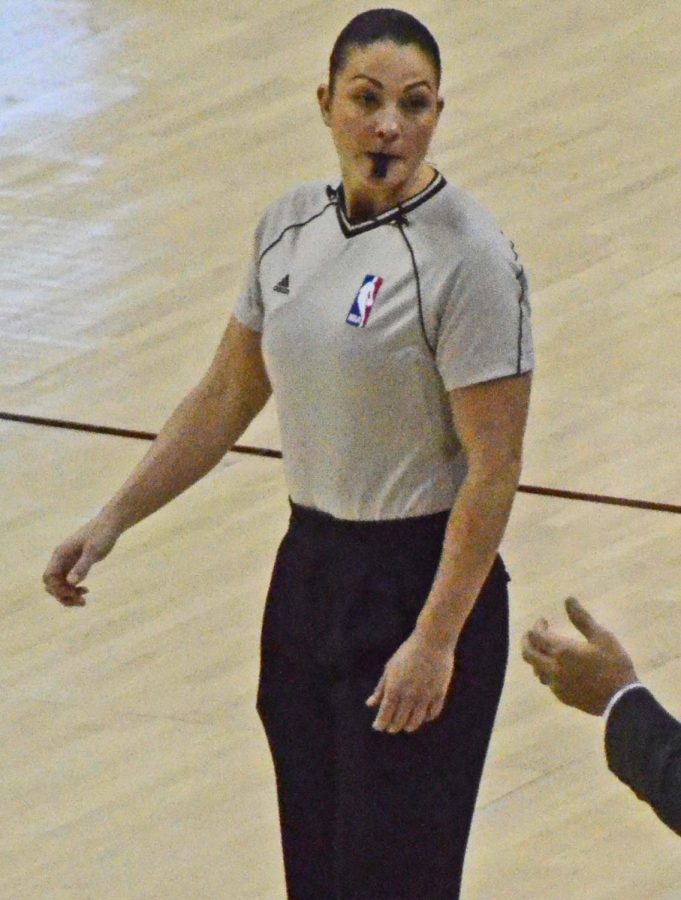The Case for More Female Referees
Lauren Holtkamp is the third woman to become a full-time referee for the NBA.
April 23, 2018
As the case is made for more representation for women in the sports world, many are debating the scarcity of female referees.
This season the National Basketball Association had one female referee out of 64 referees total. As of 2017, the National Football League has one female referee out of 124 referees. Major League Baseball currently has 91 referees, none of whom are women. The National Hockey League hasn’t had a female referee since Heather McDaniel in 1995.
However, having women as referees in a non-professional setting is not as uncommon.
SPS junior and men’s basketball team member Jule Brown has had female referees officiating his basketball games since he was a child.
“My first experience with a female referee was in fourth grade in a youth league in my area,” Brown said. “Coming from a predominantly female household, it was common seeing and accepting women who were in positions of authority, and even though I had never played in a game where a woman was a referee, it didn’t make a difference.”
NYU is part of the Eastern College Athletic Conference, which works in conjunction with all schools in the region to assign referees to college games.
John Barbuto is one of the soccer coordinators for New York state and he works with the ECAC to hire and assign referees to NYU athletics’ games.
Barbuto is also involved with the United States Soccer Federation, which has a program “committed to producing a variety of referee education resources aimed at supporting the program’s approximate 140,000 members across the country that service amateur games at the youth and adult levels.”
“We start ‘em young,” Barbuto said. “They start in the USSF program, and if they do a good job, and we see a future with them, they keep moving up. If they’re good they get games, if they’re not they don’t.”
Dee Kantner and Violet Palmer broke barriers when they became the NBA’s first ever female referees in 1997. Kantner was fired in 2002. Meanwhile, Palmer officiated 919 NBA games, becoming the first woman to helm an NBA playoff game in 2006 before retiring at the age of 52 in 2016. She crossed over into the overtly masculine world of NBA basketball not only as an African-American female, but also as as the first openly gay referee. Palmer and Kantner paved the way for more women to become referees, and now Lauren Holtkamp is carrying on the torch, and is in her third season in the NBA.
Historically, some players seem to hold a lack of respect for female referees, now it seems many athletes and coaches, like Stern sophomore and NYU baseball player Ford Ladd, are in favor of more female representation in professional officiating.
“I think most players already have this stance,” Ladd said. “Among my own teammates, and from the professional athletes that I’ve heard from, the consensus is that athletes really don’t care who is officiating as long as they are doing a good job.”
Cleveland Cavaliers star LeBron James gave a similar response when recently asked about female coaches in basketball such as Becky Hammon, the NBA’s first female assistant coach currently with the San Antonio Spurs.
“I mean, if she knows what she’s doing, we’ll love it,” James said in an interview with ESPN. “I mean, listen, at the end of the day, basketball … it’s not about male or female. You know the game, you know the game.”
Others believe that due to the aggressive nature of sports, and the riled up emotions of fans, players and coaches alike, it can be difficult to convince anyone to become a referee.
In an email to WSN, NYU basketball assistant coach Taylor Roth said that he doesn’t understand why anyone would want to be an official due to the way referees are treated by fans, coaches and players.
“You will get more female officials and more male officials if we make the job less taxing compared to the level of pay received,” Roth said. “To do that, people need to change the way they behave towards them as players, coaches and spectators.”
A version of this article was published in the Monday, April 23 print edition. Contact Bela Kirpalani at [email protected].



























































































































































